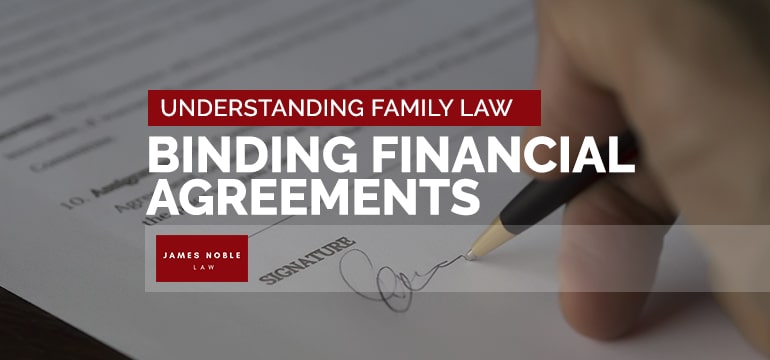


While binding financial agreement, Parties may wish to determine the ownership of their assets and liabilities whilst contemplating or living in a relationship (including same-sex relationships), contemplating entering into a marriage, during a marriage or after a divorce, may wish to set out terms in an agreement which determines how their property and liabilities should be determined should their relationship break down.
Provisions in relation to Binding Financial Agreement came into effect in the Family Law Act in 2000.
De facto Financial Agreement came into effect in the Family Law Act in 2008.

Binding Financial Agreements are dealt with in Sections 90 B, 90 C, and 90 D of the Family Law Act 1975. These relate to marriage.
The relevant provisions which are similar in nature for a de facto relationship (same-sex relationship) are in Sections 90 UB , 90 UC and 90 UD .
There is a requirement in regard to all Financial Agreement that they are in writing.
Agreements pursuant to Section 90 B relate to parties contemplating marriage.
Section 90 C relates to spousal parties during marriage before a divorce had been granted and after separation in their relationship.
Section 90 D relates to parties to a marriage after a divorce order has been made.
Financial Agreement set out “how, in the event of the breakdown of the marriage, the property and financial resources of either or both parties is to be dealt with.” In the case of 90 D, how the property acquired during the marriage should be dealt with?
Sections 90 B and 90 C also allow for provision for maintenance during marriage and or after divorce.

Binding Financial Agreement do not have any force or effect until there is a breakdown in the marriage or after a divorce in the marriage in the case of Section 90 D .
In the case of all provisions of the Family Law Act where maintenance is specified the provisions must specify the party or children for whom the maintenance is to be provided and the amount provided, or the value attributed to the party and or children for maintenance.
However, maintenance provisions in Binding Financial Agreement can be set aside by the Court if the Court is satisfied that when the agreement came into effect (that is at the time of separation or after divorce) a party to the agreement, taking into account the terms and conditions of the agreement, is unable to support him or herself without an income-tested pension, benefit or allowance.
It is a requirement in all Financial Agreements that the parties receive advice before signing the agreement as to the effect of the agreement on their rights and on the advantages and disadvantages to each party at the time the advice was provided of entering into the agreement.
Legal practitioners are required to sign a certificate in each agreement stating that the required legal advice was given to their client.

FAMILY LAW ACT 1975 – SECT 72
Right of spouse to maintenance
having regard to any relevant matter referred to in subsection 75(2).
FAMILY LAW ACT 1975 – SECT 74
Power of court in spousal maintenance proceedings
the court must join the bankruptcy trustee as a party to the proceedings
the court must join the trustee of the agreement as a party to the proceedings.
FAMILY LAW ACT 1975 – SECT 75
Matters to be taken into consideration in relation to spousal maintenance
“party ” means a party to the marriage concerned.
FAMILY LAW ACT 1975 – SECT 90
Certain instruments not liable to duty
(1) The following agreements, deeds and other instruments are not subject to any duty or charge under any law of a State or Territory or any law of the Commonwealth that applies only to or in relation to a Territory:
(a) a deed or other instrument executed by a person for the purposes of, or in accordance with, an order made under this Part;
(b) a relevant maintenance agreement that confers a benefit upon a party to, or a child of, the marriage to which the maintenance agreement relates, to the extent that the maintenance agreement confers that benefit;
(c) a deed or other instrument executed by a person for the purposes of, or in accordance with, a relevant maintenance agreement, being a deed or other instrument that confers a benefit upon a party to, or a child of, the marriage to which the maintenance agreement relates, to the extent that the deed or other instrument confers that benefit.
(2) The following maintenance agreements are relevant maintenance agreements for the purposes of this section:
(a) a registered maintenance agreement made in connection with the termination of the marriage to which the maintenance agreement relates by divorce or the annulment of the marriage to which the maintenance agreement relates;
(b) a registered maintenance agreement (other than a maintenance agreement referred to in paragraph (a)) made in contemplation of the termination of the marriage to which the maintenance agreement relates by divorce or the annulment of the marriage to which the maintenance agreement relates;
(c) a registered maintenance agreement (other than a maintenance agreement referred to in paragraph (a) or (b)) made in connection with the breakdown of the marriage to which the maintenance agreement relates;
(d) an approved maintenance agreement made in connection with the termination of the marriage to which the maintenance agreement relates by divorce or the annulment of the marriage to which the maintenance agreement relates;
(e) an approved maintenance agreement (other than a maintenance agreement referred to in paragraph (d)) made in contemplation of the termination of the marriage to which the maintenance agreement relates by divorce or the annulment of the marriage to which the maintenance agreement relates;
(f) an approved maintenance agreement (other than a maintenance agreement referred to in paragraph (d) or (e)) made in connection with the breakdown of the marriage to which the maintenance agreement relates.
(3) For the purposes of this section, a maintenance agreement, deed or other instrument that confers an entitlement to property on a person may be taken to confer a benefit upon the person notwithstanding that the maintenance agreement, deed or other instrument also deprives the person of an entitlement to other property of an equal or greater value.
(4) In this section:
(a) approved maintenance agreement means a maintenance agreement approved by a court by order under section 87;
(b) registered maintenance agreement means a maintenance agreement registered in a court under section 86 or a maintenance agreement that is registered in a court under regulations made pursuant to section 89; and
(c) a reference to the marriage to which a maintenance agreement relates is a reference to the marriage the parties to which are parties to the maintenance agreement.
FAMILY LAW ACT 1975 – SECT 90A
Definitions
In this Part:
“dealt with” includes the meaning given by subsection 90F(2).
“marriage” includes a void marriage.
FAMILY LAW ACT 1975 – SECT 90B
Financial agreement before marriage
(a) people who are contemplating entering into a marriage with each other make a written agreement with respect to any of the matters mentioned in subsection (2); and
(b) at the time of the making of the agreement, the people are not the spouse parties to any other binding agreement (whether made under this section or section 90C or 90D) with respect to any of those matters; and
(c) the agreement is expressed to be made under this section;
the agreement is a financial agreement. The people may make the financial agreement with one or more other people.
(2) The matters referred to in paragraph (1)(a) are the following:
(a) how, in the event of the breakdown of the marriage, all or any of the property or financial resources of either or both of the spouse parties at the time when the agreement is made, or at a later time and before divorce, is to be dealt with;
(b) the maintenance of either of the spouse parties:
(i) during the marriage; or
(ii) after divorce; or
(iii) both during the marriage and after divorce.
(3) A financial agreement made as mentioned in subsection (1) may also contain:
(a) matters incidental or ancillary to those mentioned in subsection (2); and
(b) other matters.
(4) A financial agreement (the new agreement) made as mentioned in subsection (1) may terminate a previous financial agreement (however made) if all of the parties to the previous agreement are parties to the new agreement.
FAMILY LAW ACT 1975 – SECT 90C
Financial agreement during marriage
(a) the parties to a marriage make a written agreement with respect to any of the matters mentioned in subsection (2); and
(b) at the time of the making of the agreement, the parties to the marriage are not the spouse parties to any other binding agreement (whether made under this section or section 90B or 90D) with respect to any of those matters; and
(c) the agreement is expressed to be made under this section;
the agreement is a financial agreement. The parties to the marriage may make the financial agreement with one or more other people.
(2) The matters referred to in paragraph (1)(a) are the following:
(a) how, in the event of the breakdown of the marriage, all or any of the property or financial resources of either or both of the spouse parties at the time when the agreement is made, or at a later time and during the marriage, is to be dealt with;
(b) the maintenance of either of the spouse parties:
(i) during the marriage; or
(ii) after divorce; or
(iii) both during the marriage and after divorce.
(2A) For the avoidance of doubt, a financial agreement under this section may be made before or after the marriage has broken down.
(3) A financial agreement made as mentioned in subsection (1) may also contain:
(a) matters incidental or ancillary to those mentioned in subsection (2); and
(b) other matters.
(4) A financial agreement (the new agreement) made as mentioned in subsection (1) may terminate a previous financial agreement (however made) if all of the parties to the previous agreement are parties to the new agreement.
FAMILY LAW ACT 1975 – SECT 90E
Requirements with respect to provisions in financial agreement relating to the maintenance of a party or a child or children
A provision of a financial agreement that relates to the maintenance of a spouse party to the agreement or a child or children is void unless the provision specifies:
(a) the party, or the child or children, for whose maintenance provision is made; and
(b) the amount provided for, or the value of the portion of the relevant property attributable to, the maintenance of the party, or of the child or each child, as the case may be.
FAMILY LAW ACT 1975 – SECT 90F
Certain provisions in agreements
(1) No provision of a financial agreement excludes or limits the power of a court to make an order in relation to the maintenance of a party to a marriage if subsection (1A) applies.
(1A) This subsection applies if the court is satisfied that, when the agreement came into effect, the circumstances of the party were such that, taking into account the terms and effect of the agreement, the party was unable to support himself or herself without an income-tested pension, allowance or benefit.
(2) To avoid doubt, a provision in an agreement made as mentioned in subsection 90B(1), 90C(1) or 90D(1) that provides for property or financial resources owned by a spouse party to the agreement to continue in the ownership of that party is taken, for the purposes of that section, to be a provision with respect to how the property or financial resources are to be dealt with.
FAMILY LAW ACT 1975 – SECT 90G
When financial agreement are binding
(1) Subject to subsection (1A), a financial agreement is binding on the parties to the agreement if, and only if:
(a) the agreement is signed by all parties; and
(b) before signing the agreement, each spouse party was provided with independent legal advice from a legal practitioner about the effect of the agreement on the rights of that party and about the advantages and disadvantages, at the time that the advice was provided, to that party of making the agreement; and
(c) either before or after signing the agreement, each spouse party was provided with a signed statement by the legal practitioner stating that the advice referred to in paragraph (b) was provided to that party (whether or not the statement is annexed to the agreement); and
(ca) a copy of the statement referred to in paragraph (c) that was provided to a spouse party is given to the other spouse party or to a legal practitioner for the other spouse party; and
(d) the agreement has not been terminated and has not been set aside by a court.
Note: For the manner in which the contents of a financial agreement may be proved, see section 48 of the Evidence Act 1995.
(1A) A financial agreement is binding on the parties to the agreement if:
(a) the agreement is signed by all parties; and
(b) one or more of paragraphs (1)(b), (c) and (ca) are not satisfied in relation to the agreement; and
(c) a court is satisfied that it would be unjust and inequitable if the agreement were not binding on the spouse parties to the agreement (disregarding any changes in circumstances from the time the agreement was made); and
(d) the court makes an order under subsection (1B) declaring that the agreement is binding on the parties to the agreement; and
(e) the agreement has not been terminated and has not been set aside by a court.
(1B) For the purposes of paragraph (1A)(d), a court may make an order declaring that a financial agreement is binding on the parties to the agreement, upon application (the enforcement application ) by a spouse party seeking to enforce the agreement.
(1C) To avoid doubt, section 90KA applies in relation to the enforcement application.
(2) A court may make such orders for the enforcement of a financial agreement that is binding on the parties to the agreement as it thinks necessary.
FAMILY LAW ACT 1975 – SECT 90H
Effect of death of party to financial agreement
A financial agreement that is binding on the parties to the agreement continues to operate despite the death of a party to the agreement and operates in favour of, and is binding on, the legal personal representative of that party.
FAMILY LAW ACT 1975 – SECT 90J
Termination of financial agreement
(1) The parties to a financial agreement may terminate the agreement only by:
(a) including a provision to that effect in another financial agreement as mentioned in subsection 90B(4), 90C(4) or 90D(4); or
(b) making a written agreement (a termination agreement) to that effect.
(2) Subject to subsection (2A), a termination agreement is binding on the parties if, and only if:
(a) the agreement is signed by all parties to the agreement; and
(b) before signing the agreement, each spouse party was provided with independent legal advice from a legal practitioner about the effect of the agreement on the rights of that party and about the advantages and disadvantages, at the time that the advice was provided, to that party of making the agreement; and
(c) either before or after signing the agreement, each spouse party was provided with a signed statement by the legal practitioner stating that the advice referred to in paragraph (b) was provided to that party (whether or not the statement is annexed to the agreement); and
(ca) a copy of the statement referred to in paragraph (c) that was provided to a spouse party is given to the other spouse party or to a legal practitioner for the other spouse party; and
(d) the agreement has not been set aside by a court.
(2A) A termination agreement is binding on the parties if:
(a) the agreement is signed by all parties to the agreement; and
(b) one or more of paragraphs (2)(b), (c) and (ca) are not satisfied in relation to the agreement; and
(c) a court is satisfied that it would be unjust and inequitable if the agreement were not binding on the spouse parties to the agreement (disregarding any changes in circumstances from the time the agreement was made); and
(d) the court makes an order under subsection (2B) declaring that the agreement is binding on the parties to the agreement; and
(e) the agreement has not been set aside by a court.
(2B) For the purposes of paragraph (2A)(d), a court may make an order declaring that a termination agreement is binding on the parties to the agreement, upon application (the enforcement application ) by a spouse party seeking to enforce the agreement.
(2C) To avoid doubt, section 90KA applies in relation to the enforcement application.
(3) A court may, on an application by a person who was a party to the financial agreement that has been terminated, or by any other interested person, make such order or orders (including an order for the transfer of property) as it considers just and equitable for the purpose of preserving or adjusting the rights of persons who were parties to that financial agreement and any other interested persons.
Note: For the manner in which the contents of a financial agreement may be proved, see section 48 of the Evidence Act 1995.
FAMILY LAW ACT 1975 – SECT 90K
Circumstances in which court may set aside a financial agreement or termination agreement
(1) A court may make an order setting aside a financial agreement or a termination agreement if, and only if, the court is satisfied that:
(a) the agreement was obtained by fraud (including non-disclosure of a material matter); or
(b) a party to the agreement entered into the agreement:
(i) for the purpose, or for purposes that included the purpose, of defrauding or defeating a creditor or creditors of the party; or
(ii) with reckless disregard of the interests of a creditor or creditors of the party; or
(c) a party (the agreement party) to the agreement entered into the agreement:
(i) for the purpose, or for purposes that included the purpose, of defrauding another person who is a party to a de facto relationship with a spouse party; or
(ii) for the purpose, or for purposes that included the purpose, of defeating the interests of that other person in relation to any possible or pending application for an order under section 90SM, or a declaration under section 90SL, in relation to the de facto relationship; or
(iii) with reckless disregard of those interests of that other person; or
(b) the agreement is void, voidable or unenforceable; or
(c) in the circumstances that have arisen since the agreement was made it is impracticable for the agreement or a part of the agreement to be carried out; or
(d) since the making of the agreement, a material change in circumstances has occurred (being circumstances relating to the care, welfare and development of a child of the marriage) and, as a result of the change, the child or, if the applicant has caring responsibility for the child (as defined in subsection (2)), a party to the agreement will suffer hardship if the court does not set the agreement aside; or
(e) in respect of the making of a financial agreement–a party to the agreement engaged in conduct that was, in all the circumstances, unconscionable; or
(f) a payment flag is operating under Part VIIIB on a superannuation interest covered by the agreement and there is no reasonable likelihood that the operation of the flag will be terminated by a flag lifting agreement under that Part; or
(g) the agreement covers at least one superannuation interest that is an unsplittable interest for the purposes of Part VIIIB.
(1A) For the purposes of paragraph (1)(aa), creditor , in relation to a party to the agreement, includes a person who could reasonably have been foreseen by the party as being reasonably likely to become a creditor of the party.
(2) For the purposes of paragraph (1)(d), a person has caring responsibility for a child if:
(a) the person is a parent of the child with whom the child lives; or
(b) a parenting order provides that:
(i) the child is to live with the person; or
(ii) the person has parental responsibility for the child.
(3) A court may, on an application by a person who was a party to the financial agreement that has been set aside, or by any other interested person, make such order or orders (including an order for the transfer of property) as it considers just and equitable for the purpose of preserving or adjusting the rights of persons who were parties to that financial agreement and any other interested persons.
(4) An order under subsection (1) or (3) may, after the death of a party to the proceedings in which the order was made, be enforced on behalf of, or against, as the case may be, the estate of the deceased party.
(5) If a party to proceedings under this section dies before the proceedings are completed:
(a) the proceedings may be continued by or against, as the case may be, the legal personal representative of the deceased party and the applicable Rules of Court may make provision in relation to the substitution of the legal personal representative as a party to the proceedings; and
(b) if the court is of the opinion:
(i) that it would have exercised its powers under this section if the deceased party had not died; and
(ii) that it is still appropriate to exercise those powers;
the court may make any order that it could have made under subsection (1) or (3); and
(c) an order under paragraph (b) may be enforced on behalf of, or against, as the case may be, the estate of the deceased party.
(6) The court must not make an order under this section if the order would:
(a) result in the acquisition of property from a person otherwise than on just terms; and
(b) be invalid because of paragraph 51(xxxi) of the Constitution.
For this purpose, acquisition of property and just terms have the same meanings as in paragraph 51(xxxi) of the Constitution.
FAMILY LAW ACT 1975 – SECT 90KA
Validity, enforceability and effect of financial agreement and termination agreements
The question whether a financial agreement or a termination agreement is valid, enforceable or effective is to be determined by the court according to the principles of law and equity that are applicable in determining the validity, enforceability and effect of contracts and purported contracts, and, in proceedings relating to such an agreement, the court:
(a) subject to paragraph (b), has the same powers, may grant the same remedies and must have the same regard to the rights of third parties as the High Court has, may grant and is required to have in proceedings in connection with contracts or purported contracts, being proceedings in which the High Court has original jurisdiction; and
(b) has power to make an order for the payment, by a party to the agreement to another party to the agreement, of interest on an amount payable under the agreement, from the time when the amount became or becomes due and payable, at a rate not exceeding the rate prescribed by the applicable Rules of Court; and
(c) in addition to, or instead of, making an order or orders under paragraph (a) or (b), may order that the agreement, or a specified part of the agreement, be enforced as if it were an order of the court.
FAMILY LAW ACT 1975 – SECT 90L
Financial and other agreements etc. not liable to duty
None of the following is subject to any duty or charge under any law of a State or Territory or any law of the Commonwealth that applies only in relation to a Territory:
(a) a financial agreement;
(b) a termination agreement;
(c) a deed or other instrument executed by a person for the purposes of, or in accordance with, an order or financial agreement made under this Part.
Financial Agreement can be set aside if they have not been freely entered into by each party. The leading decision in regard to this the case Thorn v Kennedy .
To learn more about Binding Financial Agreements and if this document could be useful for your particular situation, contact the team of Brisbane Family Lawyers at James Noble Law.
If you need any help, please contact the team at James Noble Law for a FREE 20-minute consultation today to schedule an appointment with one of our Qualified and experienced Family lawyers Brisbane.
You may also like to know more information about the